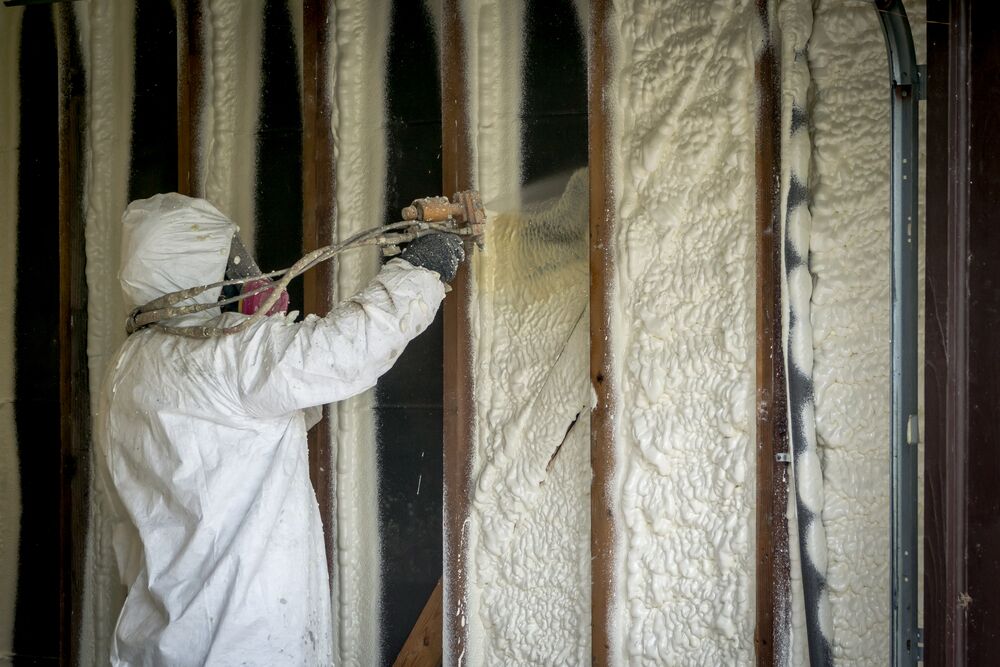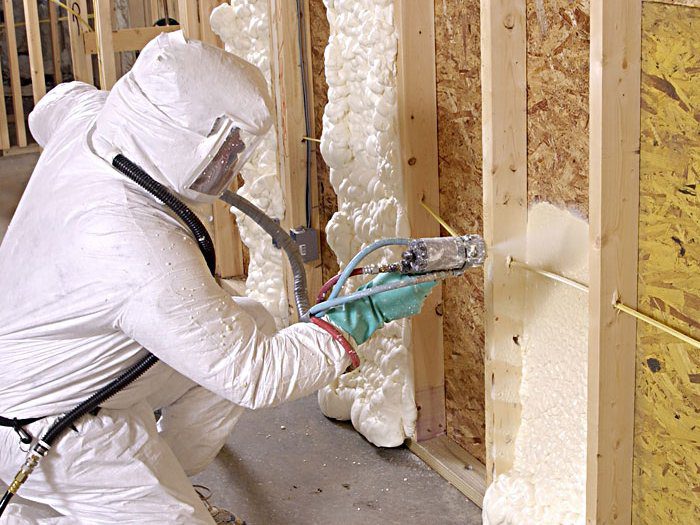Choosing the Right Type of Spray Foam for Your Insulation Needs
Choosing the Right Type of Spray Foam for Your Insulation Needs
Blog Article
Leading Factors to Choose Spray Foam for Your Next Insulation Task
When thinking about insulation alternatives for your next job, spray foam attracts attention due to its excellent efficiency characteristics and efficiency benefits. Its exceptional R-value not just boosts thermal resistance but also adds to considerable power financial savings over time. Additionally, the product's capacity to create an airtight seal efficiently minimizes air seepage and decreases the threat of moisture-related issues, such as mold growth. As you weigh your choices, exploring the versatile applications and long-term advantages of spray foam might disclose engaging factors to integrate it into your insulation method.
Superior Insulation Efficiency

The high R-value of spray foam, which determines its thermal resistance, is another essential benefit. Closed-cell spray foam, for example, can accomplish an R-value of approximately 6.5 per inch, substantially outshining fiberglass batts and cellulose. Furthermore, spray foam insulation produces an impermeable seal, which minimizes thermal connecting and lowers the potential for mold development as a result of moisture accumulation.

Power Effectiveness Perks
The energy efficiency benefits of spray foam insulation are significant, further boosting its allure as a top choice for building insulation. Among the key benefits is its exceptional thermal performance. Spray foam expands upon application, developing a closed seal that lessens air leaks, which is an usual resource of energy loss in traditional insulation products. By properly minimizing thermal connecting, it maintains a regular indoor temperature, therefore reducing heating & cooling expenses.
Additionally, spray foam insulation flaunts a high R-value per inch, which means it offers a lot more thermal resistance in less space compared to choices like fiberglass or cellulose (Spray Foam). This effectiveness not just adds to instant power cost savings yet likewise advertises long-term sustainability by minimizing the total energy usage of a structure
Additionally, the execution of spray foam can qualify house owners for energy performance incentives and tax credit scores, adding monetary advantages to its energy-saving capacities. In an era where energy conservation is extremely important, selecting spray foam insulation not only boosts convenience but likewise lines up with eco liable practices, making it a prudent option for both household and commercial jobs.
Dampness and Mold And Mildew Resistance
Given its distinct structure and application technique, spray foam insulation supplies remarkable wetness and mold resistance, making it a suitable selection for numerous settings. The closed-cell framework of spray foam develops a strong barrier that effectively page seals potential moisture ingress, thereby reducing the likelihood of mold growth. Unlike traditional insulation products, which can soak up water and give a breeding place for mold and mildew, spray foam continues to be resistant to dampness, boosting the general health and wellness of the indoor environment.
Furthermore, the application process of spray foam entails increasing and filling up splits and spaces, guaranteeing a limited seal that decreases air leakages. This particular not only improves energy efficiency yet likewise assists control humidity degrees within the area. Proper moisture control is crucial for preventing mold and mildew and mildew, making spray foam insulation particularly useful in areas prone to wetness, such as basements and creep areas.
In addition to its moisture-resistant residential properties, spray foam is also naturally resistant to mold and mildew growth. This characteristic makes sure that buildings and homes continue to be risk-free and healthy and balanced gradually, offering tranquility of mind to property owners and structure managers alike.
Long-Term Price Savings
Buying spray foam insulation returns substantial long-lasting price savings, largely with boosted energy effectiveness. Unlike traditional insulation materials, spray foam develops a closed seal that decreases air leakage. This decrease in drafts leads to reduce home heating and cooling expenses, as HVAC systems do not have to function as hard to maintain comfy interior temperatures.
Moreover, the premium insulating properties of spray foam imply that homes continue to be consistently comfortable year-round, minimizing dependence on energy-consuming appliances. In time, these cost savings can gather, causing a noticeable reduction in utility expenses.
Additionally, spray foam insulation adds to the durability of your home's framework by stopping dampness buildup and mold and mildew development, which can lead to costly repair work. With its toughness and resistance to resolving, spray foam keeps its performance over the years, guaranteeing that the preliminary investment continues to settle.
Fundamentally, choosing spray foam insulation not only enhances your home's energy efficiency but also translates right into significant long-term financial advantages, making it a wise investment for property owners wanting to decrease costs while boosting convenience and sustainability.
Versatile Application Choices
Various application options make spray foam insulation a highly functional selection for a range of building tasks (Spray Foam). This try this flexibility enables it to be efficiently utilized in household, business, and industrial settings, accommodating diverse insulation needs
Spray foam can be used in attic rooms, walls, crawl rooms, and even roofs, giving seamless coverage that removes spaces and gaps where air leaks generally take place. Its capability to expand upon application makes certain a tight seal, which is important for power effectiveness and dampness control.
Furthermore, spray foam insulation is available in various formulations, consisting of open-cell and closed-cell types, enabling for tailored remedies based upon specific job requirements. Open-cell foam is lighter and much better suited for soundproofing, while closed-cell foam uses superior insulation and structural honesty, making it optimal for locations exposed to wetness.
Furthermore, spray foam can be applied in hard-to-reach rooms, improving its viability for retrofitting existing structures. With the ability to follow various substratums, consisting of concrete, metal, and wood, spray foam insulation attracts attention as a versatile choice that fulfills the demands of contemporary structure techniques.
Conclusion
In verdict, spray foam insulation emerges as an exceptional option for insulation tasks due to its exceptional thermal resistance, power effectiveness, and ability to create impermeable seals that stop moisture and mold and mildew development. Choosing spray foam insulation guarantees a comprehensive remedy that satisfies the demands of modern-day building and power effectiveness standards.
When it comes to attaining ideal power effectiveness in domestic and business structures, spray foam insulation stands out for its exceptional insulation efficiency.The energy performance benefits reference of spray foam insulation are substantial, further boosting its charm as a leading choice for constructing insulation.Investing in spray foam insulation returns significant long-lasting price savings, largely with enhanced energy performance.In conclusion, spray foam insulation arises as a superior choice for insulation tasks due to its extraordinary thermal resistance, power efficiency, and capability to develop airtight seals that stop dampness and mold development. Selecting spray foam insulation makes sure a thorough solution that satisfies the needs of modern-day construction and energy effectiveness criteria.
Report this page